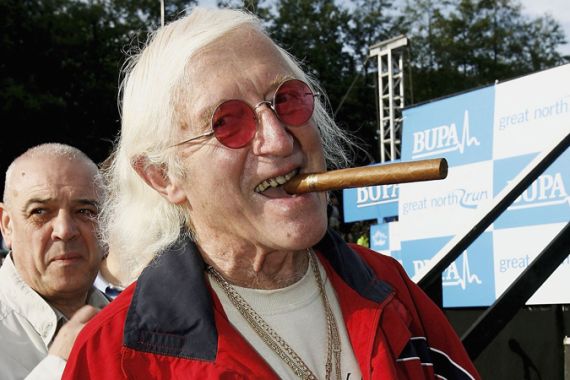What does Jimmy Savile mean?
Jimmy Savile, “clearly a skillful manipulator”, fully exploited the power his celebrity and his charity work gave him.

It is part of the lore of childhood, learnt from fairy tales, from teachers and parents, from nervous jokes in the playground: you don’t talk to strangers. On Saturday nights between 1975 and 1994 huge audiences tuned into the BBC television show, Jim’ll Fix It. On it they watched a very strange man called Jimmy Savile making children’s wishes come magically true. A stock scenario of the public information film, in which a suspect older man offered a child sweets or a chance to see some puppies, metamorphosed into family entertainment. Now we are learning that Savile was a prolific and vicious abuser of children. It is both deeply shocking and somehow unsurprising.
This isn’t just a sinister chapter in the history of show business. Savile had a flat at Stoke Mandeville hospital and he worked as a volunteer porter at Leeds General hospital for years. He was a regular visitor to children’s homes. He had the run of Broadmoor, a high security psychiatric hospital. According to a report in the Guardian, in 1988 the Department of Health even appointed him “to lead a ‘taskforce’ overseeing the management of the hospital after its management board was dismissed by the then health secretary, Kenneth Clarke”. For reasons that are now being investigated by the Department of Health he had a set of keys. A source told the Mirror that “Savile did what he liked at Broadmoor and nobody could stop him”.
Not only prime time television, then, but also the hospital, the school, and what would once have been called the asylum. The stories now emerging have an unreal, uncanny quality. The inexplicably popular entertainer with his strange mannerisms, gold chains and outlandish tracksuits seems like a properly demonic figure, making a mockery of what trusted institutions claimed to be, what thousands of people tried to make them.
That Savile was able to frighten his young victims into silence is understandable. But at least some adults knew what he was doing. On one of his visits to Stoke Mandeville one nurse is alleged to have told a disabled patient that “the best thing you can do is stay in bed, don’t ask to be put in your wheelchair today and pretend to be asleep”. Others, including a BBC employee, have said they saw him abusing children and felt they couldn’t act.
|
“A full inquiry must now establish what, if anything, the police, the security services and the political class knew about him [Jimmy Savile] and his crimes during |
“King Jimmy” as he called himself fully exploited the power his celebrity and his charity work gave him. But there is more to it than his individual villainy and cunning. As the campaigner for tax justice Richard Murphy says, “this society massively hierarchical: power is afforded to those at the top. The rest are meant to obey”. So the nurse thought she could only whisper a warning to the child in their care. Savile’s exploited the opportunities for tyranny that riddle British social relations.
The same steep inequality still means that all manner of criminality is passed over in silence or noted briefly before being dismissed. Murphy mentions the way the rich evade taxes. This year we have also learned that high street banks launder profits from the drugs trade and defraud the public on a massive scale. These are only two scandals that we know about. They are part of a much wider system in which the criminal law is for little people. We can only begin to speculate about what else the powerful get away with. If they are willing to wage aggressive war they are capable of anything.
The leader of the opposition Ed Miliband has called for a full inquiry into Savile’s criminal career. He is right to say that the BBC cannot be left to investigate itself. The same is true of the Department for Health and the island of Jersey, where Savile is believed to have abused a number of children on visits to the Haut de la Garenne children’s home. Justice Secretary Chris Grayling has said that “it’s right and proper that the police investigate all allegations”. But the British police cannot investigate allegations about crimes committed in Jersey, given its strange constitutional status. A full and independent commission of inquiry is needed. If it leads to reform of Jersey, incidentally one of the world’s most significant tax havens, then that can only be for the good.
Savile was clearly a skillful manipulator. But it is time we learnt how he could live out his grotesque fantasies on the national stage for so long, how he ever became possible. He was a friend and confidant of at least one member of the Royal Family and at least one Prime Minister. As such he would have attracted the attention of some of the sharpest minds in the permanent administration. A full inquiry must now establish what, if anything, the police, the security services and the political class knew about him and his crimes during his lifetime. Did they really know less than the staff at Stoke Mandeville? Less than Savile’s countless victims?
There are other questions that only a full and independent inquiry can answer. What does Savile tell us about the country where he flourished for so long? What does he tell us about those responsible for the integrity of its governing institutions? Just what exactly does Jimmy Savile mean?
Dan Hind is the author of two books, The Threat to Reason and The Return of the Public. His pamphlet, Common Sense: Occupation, Assembly, and the Future of Liberty, was published as an e-book in March. He is a member of the Tax Justice Network.
